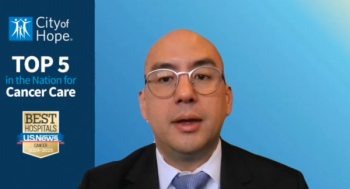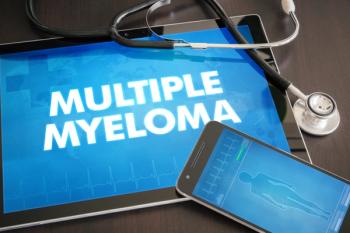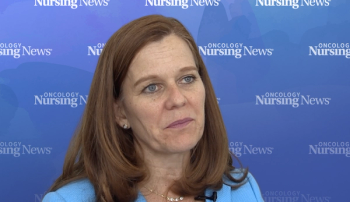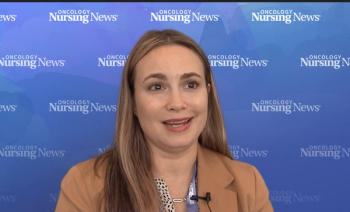
Oncology nurses “play a pivotal role in guiding patients” through the genetic testing process, an expert explained.

Oncology nurses “play a pivotal role in guiding patients” through the genetic testing process, an expert explained.

Clinicians should consider a rapid taper approach for patients with cancer who exhibit repeated signs of opioid misuse, an expert said.

While bispecific antibodies tend to be well-tolerated for patients with multiple myeloma, there are still adverse effects clinicians should discuss with their patients.

At a recent Community Case Forum, an expert discussed the risk of cytokine release syndrome after patients undergo CAR T-cell therapy.

Topical treatments may help ease chemotherapy-induced peripheral neuropathy, but more research is needed.

With many patients utilizing medical cannabis, it is important for nurses to be aware of potential drug-drug interactions, an expert said.

An oncology nurse discusses 4 common barriers certain patient populations face when it comes to oncology clinical trials, and what clinicians can do to mitigate these disparities.

An ad-hoc analysis found a higher rate of severe and life-threatening infections in patients with RET-mutant lung cancer treated with pralsetinib.

With newer breast cancer treatments, it’s essential that nurses and APPs educate themselves and advocate for their patients.

A nurse practitioner discusses how breast cancer treatment can impact sexual health, and how nurses and APPs can guide patients through these effects.

Here’s a roundup of FDA approvals in the oncology space from October 2024.

The FDA granted an accelerated approval to asciminib for newly diagnosed Ph+ chronic myeloid leukemia in the chronic phase.

“You can control where you focus your attention,” said Anne M. Reb, PhD, NP, who recently presented on a nurse-led intervention for patients who experience fear of cancer recurrence.

Research is analyzing the effect of imtermittent fasting on quality of life outcomes in patients undergoing radiation therapy.

Advanced practice providers discuss the second-line use of elacestrant in patients with co-mutated, ER+, HER2—advanced or metastatic breast cancer

A nurse practitioner discusses ASCO’s recommendations of CDK4/6 inhibitors—namely abemaciclib and ribociclib—in certain high-risk breast cancer settings.

The FDA approved zolbetuximab-clzb plus fluoropyrimidine- and platinum-containing chemotherapy for patients with CLDN18.2-positive locally advanced unresectable or metastatic HER2-negative gastric or gastroesophageal junction (GEJ) adenocarcinoma.

Providers should consider lifestyle preferences and other conditions/comorbidities before deciding between bispecific antibodies or CAR T-cell therapy in myeloma.

“Treatment effectiveness can have different meanings to patients,” a physician assistant said when discussing therapy for high-risk myeloma.

A poll of experts revealed that few are utilizing talquetamab for patients with pretreated relapsed/refractory myeloma.

Testing for ESR1 mutations is essential after ER-positive HER2-negative breast cancer progressed.

Inavolisib plus palbociclib and fulvestrant was approved for the treatment of PIK3CA-mutant, HR-positive, HER2-negative locally advanced or metastatic breast cancer.

The staging of small cell lung cancer significantly impacts treatment plans and potential side effects.

Patients with breast cancer who are of childbearing age may face issues that are accentuated by their age, an expert explained.

A nurse practitioner discussed considerations for managing aromatase inhibitor-related joint pain in patients with breast cancer.

As biomarkers continue to be explored in resectable melanoma, oncology nurses will play a crucial role in the clinical trial process.

Oral drugs in the HR-positive, HER2-negative metastatic breast cancer space put a focus on clear patient-provider communication about adherence and adverse events.

The FDA granted a priority review to acalabrutinib for the treatment of previously untreated adults with mantle cell lymphoma.

The FDA approved neoadjuvant nivolumab plus chemo, followed by adjuvant nivolumab for non-small cell lung cancer without EGFR mutations or ALK rearrangements.

When it comes to cancer-related malnutrition, nurses should look out for more signs than just weight loss.

Published: October 17th 2024 | Updated: December 17th 2024

Published: October 14th 2024 | Updated:

Published: October 29th 2024 | Updated:

Published: April 20th 2021 | Updated:

Published: September 17th 2021 | Updated:

Published: February 27th 2021 | Updated: